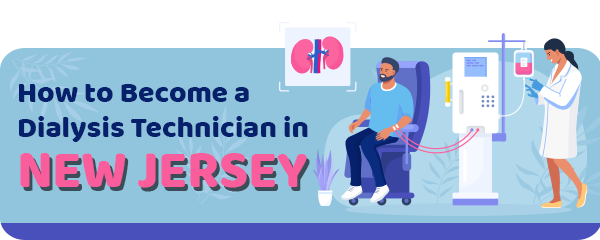Without dialysis machines and skilled operators, the lives of many individuals would be at significantly greater risk.
This underscores the vital role of dialysis technicians within the healthcare sector.
Though operating dialysis machines might not seem glamorous, it offers a profoundly rewarding career path for those with a passion for helping others.
If you’re keen on exploring this profession further, you’ve come to the right place.
Continue reading to delve deeper.
Article Table of Contents
Dialysis Technician Job Description in New Jersey
Before embarking on a career, it’s essential to comprehend the responsibilities it entails.
Dialysis technicians in New Jersey primarily serve patients with kidney ailments.
Their central duty involves ensuring the seamless operation of dialysis machines, tailored to each patient’s unique requirements.
These responsibilities encompass:
- Monitoring the vital signs of patients
- Assisting patients throughout the dialysis procedure
- Ensuring the safety and comfort of patients
- Reviewing patients’ medical history to identify potential concerns during the procedure
- Adjusting dialysis machines to suit individual patient needs
- Administering oxygen when necessary
- Basic Cardiopulmonary Resuscitation (CPR) if required
While these duties form the core of a dialysis technician’s role, the day-to-day responsibilities may vary.
Dialysis Technician Requirements in New Jersey
In New Jersey, individuals embarking on this career journey operate under the jurisdiction of the private sector.
This state doesn’t impose stringent requirements for dialysis technician training and certification.
Instead, technicians follow the guidance established by the Centers for Medicare and Medicaid Services (CMS).
The CMS stipulates that prospective dialysis technicians must:
- Possess a high school diploma or General Education Development (GED) certificate
- Complete formal training
- Attain certification by demonstrating competency in standards of practice
- Obtain licensure or certification
- Gaining experience
Certification should be obtained within 18 months of commencing employment.
Several nationally recognized certifications include:
- The Nephrology Nursing Certification Commission (NNCC)
- Certified Clinical Hemodialysis Technician (CCHT) Exam
- The Board of Nephrology Examiners Nursing and Technology (BONENT)
- Certified Hemodialysis Technician (CHT) Exam
- The National Nephrology Certification Organization, Inc. (NNCO)
- Certified in Clinical Nephrology Technology (CCNT) Exam
- Certified in Biomedical Nephrology Technology (CBNT) Exam
New Jersey’s specific guidelines for this profession are limited, but some key requirements include passing both a written and practical exam.
Certified technicians must also complete continuing education courses every two years and pass a recertification exam every four years.
Dialysis Technician Training in New Jersey
Prospective dialysis technicians in New Jersey should initiate their journey by graduating from high school or obtaining a GED.
High school students should focus on these subjects:
- Biology
- Chemistry
- Medical terminology
- Anatomy
- Physiology
However, the comprehensive training for this profession occurs in post-secondary educational institutions, including vocational schools, community colleges, and technical institutes.
The training covers essential topics including:
- Principles of dialysis
- Care of patients with kidney failure
- Possible complications of dialysis
- Water treatment and dialysate preparation
- Infection control
- Safety Dialyzer reprocessing
A typical training program for dialysis technicians in New Jersey spans approximately one year.
Below, you’ll find a list of approved institutions in New Jersey offering courses for this profession:
Branford Institute 
The program covers both theoretical knowledge and practical, hands-on training within a classroom setting.
It delves into essential aspects like the fundamentals of:
- Normal kidney physiology,
- The core principles of hemodialysis,
- The operation of kidney dialysis machines,
- Dialyzer preparation and reprocessing procedures
- Techniques for supporting dialysis patients in managing their condition and treatment.
The courses are designed to be highly interactive, offering students an immersive and enriched learning experience.
It’s worth noting that Branford Institute holds approval from the Board of Nephrology Examiners Nursing Technology (BONENT).
Upon successful completion of our Dialysis Technician program, graduates become eligible to sit for certification examinations, specifically the Certified Hemodialysis Technician (CHT) exam.
Camden County College 
The program lasts for 600 hours and equips students for an entry-level role as a trainee in Hemodialysis Technician.
This comprehensive program empowers graduates to efficiently navigate the standard orientation program within a dialysis facility by offering an in-depth theoretical foundation and hands-on clinical training in a laboratory environment.
It effectively accelerates their journey toward becoming skilled professionals in this field.
Some of the classes include:
- Renal Theory
- Clinical Renal Practice ~ Lab
- Nursing Principles for Dialysis Technicians
- Anatomy and Physiology
- Medical Terminology
- Phlebotomy
- EKG
| School Name | Address |
|---|---|
| Camden County College | 200 College Dr Blackwood, NJ 08012-3228 |
| Branford Institute | 302 Main St Fl 2 Paterson, NJ 07505 |
Dialysis Technician Salary in New Jersey
Before embarking on any career, it’s crucial to consider the potential income.
Dialysis technicians typically start at the entry-level, with an average annual salary of $48,400.
To discover which cities in New Jersey offer higher salaries for this profession, refer to the table provided below.
Annual Salary Range:| Location | Avg. Annual Salary |
|---|---|
| Union City | $51,700 |
| Weehawken | $51,700 |
| Allendale | $50,800 |
| Wyckoff | $50,800 |
| Bergenfield | $50,700 |
| Butler | $50,700 |
| Caldwell | $50,300 |
| Union | $49,800 |
| Somerville | $49,500 |
| Lakewood | $49,100 |
Regional Salary in New Jersey
| Region | Employed | Avg. Annual Salary | Avg. Hourly Pay | Top 10% Annual Salary | Bottom 10% Annual Salary |
|---|---|---|---|---|---|
| Atlantic City-Hammonton, NJ | 100 | $74,700 | $35.91 | $103,810 | $38,730 |
| Trenton, NJ | 510 | $67,240 | $32.33 | $95,390 | $39,400 |
* Employment conditions in your area may vary.
Frequently Asked Questions
Which Other Skills Are Required for a Dialysis Technician in New Jersey?
Dialysis techs must possess a series of skills and abilities.
These include:
- Attention to details
- Excellent communication
- Empathy
- Patience
- Compassion
- Technical mind
Do I need a license or a certification to work as a dialysis technician in New Jersey?
In New Jersey, individuals only need a certification recognized at the national level if they want to work as dialysis technicians.
Where Does a Dialysis Technician in New Jersey Find Work?
There are many different settings where a dialysis technician can find employment.
The following locations are the most common:
- Hospitals
- Dialysis centers
- Outpatient clinics
- Home healthcare agencies
Read the full guide: How to Become a Dialysis Technician


